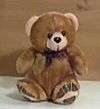Ty Inc.
 | |
| Founded | 1986 |
|---|---|
| Founder | Ty Warner |
| Headquarters | Oak Brook, Illinois, U.S. |
| Products | Beanie Babies, Beanie Boos, Frizzys, Disney, My Little Pony, Hello Kitty, TMNT, SpongeBob SquarePants, MLB, NBA, NHL, NFL, Rush Zone, Paw Patrol, Despicable Me |
| Owner | Ty Warner |
| Website |
ty |
Ty Inc. is an American multinational corporation headquartered in Oak Brook, Illinois, a suburb of Chicago. Founded by Ty Warner in 1986, Ty is now the largest manufacturer of stuffed plush toys in the world. It designs, develops and sells products exclusively to specialty markets worldwide.
Products
Beanie Boos
Beanie Boos (November 1993 – 1999; 2000–present): These handheld plush animals filled with cotton and plastic pellets evolved into the world's first Internet sensation. Currently there are hundreds of different styles and variations of Beanie Boos.
Plush Animals
Ty began by producing stuffed toy cats, and has produced many stuffed animals since. The company's logo is a red heart with the lower-case letters "ty." A tag in this shape is found affixed to all Ty stuffed toys, and inside each tag is the name of the toy and a short poem (4 lines in most, but 2 lines in Beanie Boos and early Ballz).
- BabyTy (1999-2005): a collection of soft plush animals intended for toddlers. The original Baby Ty collection focused on designs similar to those of a previous line, Pillow Pals. However, when the line was re-launched in 2005, more different plush characters (baby animals, humans) and even blankets were made available.
- Beanie Buddies (1998–present): larger replicas of actual Beanie Babies, filled with stuffing and pellets. Since early 2000, Beanie Buddies can be large, extra large or jumbo.
- Pillow Pals (1995-2000): also larger replicas of actual Beanie Babies, but softer, and made for small children. Though many Pillow Pals resembled various Beanie Babies, they were named differently. In 1999, the Pillow Pal line was modified, and their colors were changed. Pillow Pals were discontinued in early 2000.
- Ty Classic (1986–present): conventional plush animals that have been manufactured by Ty since its establishment. Numerous fabrics are used for these, as well as traditional stuffing and plastic pellets. The name "Ty Classic" was adopted in January 2000.
- Pinkys (2005–present): stuffed animals made with mostly pink and white fabrics. Certain designs of Beanie Babies and Ty Classic plush have been categorized as Pinkys.
- Pluffies (2002–present): small plush toys made with a soft fabric called Tylux. They are machine washable and intended for small children.
- Punkies (2002-2009): stuffed animals made with TyTips, a fabric covered in long hairs. Although the line was discontinued in late 2005, a Valentine's Day-themed set of Punkies was released one year later. Webkinz are also made with TyTips.
- Teenie Beanie Babies (1996-2000; 2004; 2008): smaller versions of Beanie Babies that were included in McDonald's Happy Meals. The first set of Teenie Beanie Babies was available in the United States in 1996, with three more annual promotions to follow. Another giveaway promotion occurred in the summer of 2004 when McDonald's celebrated the 25th anniversary of the Happy Meal in America. In recent years, there have also been promotions for Teenie Beanies in the UK and Southeast Asia.
- Teenie Beanie Boos (2014): created for the 35th anniversary of the Happy Meal in 2014. They are smaller versions of the large-eyed Beanie Boos.
- Ornaments: smaller versions of holiday-themed Beanie Babies. They include Jingle Beanies for Christmas, Halloweenie Beanies for Halloween, and Basket Beanies for Easter.
- Valenteenies (2006): a set of key clips featuring bears holding large conversation hearts, released only for Valentine's Day of 2006.
- Bow Wow Beanies (2006–present): dog toys modeled after Beanie Babies, licensed characters such as Garfield, and bones, in various sizes and colors. When squeezed, the toys squeak or crinkle.
- Alphabet Beanies (2005–present): a sub-collection of the Beanie Babies line which features small bears holding large colorful letters.
- Angeline (2005–present): an angelic doll created with various seasonal outfits including Christmas, Easter, and Valentine's Day. Each comes with a book.
- Beanie Kids (2000-2002): medium-sized dolls in male and female versions, with clothes and accessories called "Ty Gear".
- Beanie Boppers (2001-2005): larger dolls with more elaborate clothing and design, made to appeal towards younger girls. In their four years of production, numerous designs have been released, including exclusive designs for American, European, and Japanese baseball and soccer teams.
- Teenie Beanie Boppers (2002-2005): smaller versions of Beanie Boppers with a wire skeleton inside the doll which allows them to be posed. Exclusive designs for many American and international sports teams have been released.
- Attic Treasures (1992-2002): Victorian stuffed animals that often sport clothing and/or jointed limbs.
- Ty Gear (2000-2003): various costumes and clothing made for Beanie Kids. During the line's final year, life-sized totes were made and sold for girls.
- Ty Girlz (2007-2013): a collection of plush dolls similar to Beanie Boppers. Each has a scratch-off code inside the hang tag that allowed access to a special interactive website at TyGirlz.com. Users could create their own rooms, explore the site's world, purchase clothing, and interact with the Ty Girlz characters. In January 2009, Ty released two new Ty Girlz, Sweet Sasha and Marvelous Malia. Media reports linked the names to Sasha and Malia Obama, daughters of United States President Barack Obama. Ty's Senior Vice President of Sales said that the dolls were not made to physically resemble either of the Obama daughters and that the names chosen "worked very well with the dolls". The dolls were later retired and re-released as Marvelous Mariah and Sweet Sydney.[1]
- Beanie Babies 2.0 (2008-2010): a line featuring a secret code that allowed users to visit a kid-safe virtual world where they could play games, chat with friends, explore lands, create scrapbooks, decorate rooms, and interact with their Beanie Babies 2.0.
- Beanie Boos (2009–present): stuffed animals with large eyes, available in dozens of styles.
- Monstaz (2011-2014): plush monsters with embroidered hearts. Pushing the hearts causes the Monstaz to speak.
- Beanie Ballz (2011–present): plush balls in the forms of animals or licensed characters.
- Wildz (2011-2012): a short-lived line of stuffed jungle animals.
- Frizzys (2014–present): a line created to replace the Monstaz; they are monsters with crazy, long hair, but no sound modules.
- My Little Pony (2016–present): a plushie line based on the Hasbro toys of the same name.
- Mini Boos (2017–present) Beanie Boos characters, but in collectible mini-figure form. Some are just plastic and some are flocked, and there is a chaser figure in each series.
Digital products
In 2007 Ty launched its first online virtual world for girls, Ty Girlz. In 2008 it launched the virtual world for the Beanie Babies. In 2011 the company launched its first mobile iPhone game, Beanie Ballz Bounce.[2]
Internet
First business-to-consumer Website
Ty, Inc. was the first business to produce a business to consumer Website designed to engage their market. This is a major contributing factor to the early and rapidly growing popularity of Beanie Babies. By the time the first iteration of the Ty Web site was published in late 1995, only 1.4% of Americans were using the Internet.[3] In tandem with the launch of the Ty Website, all Beanie Baby hangtags had the Ty Website URL and a call to action printed underneath the poems and birthdays that commanded audiences to visit the company Web site with text that read: Visit our web page!!! As a result, hordes of consumers were visiting the Ty Web site by the thousands to gain information about Beanie Babies which was completely unprecedented at that time. Ty is the first business to leverage their Web site to connect and engage with consumers of their products. This effort evolved into the world's first Internet sensation.[4]
Fundraising
Ty, Inc. has been involved in a large amount of fundraising. Some has been through the sale of certain Beanie Babies, with the proceeds have been donated to various causes. It has also been through other means, such as voting for a fee.[5]
One such fundraising Beanie Baby was Ariel, made to raise funds for the Elizabeth Glaser Pediatric AIDS Foundation. Its sales raised a total of $3.4 million for the foundation.[6] Others include Aware and Awareness, sold to raise funds for breast cancer research and awareness; and Barbaro, created in memory of Barbaro the Horse, to raise funds for the University of Pennsylvania School of Veterinary Medicine, which tried to save the horse.
Ty has also raised money for the 2004 PGA Tour with a beanie called ChariTee; one, signed by Jack Nicklaus was auctioned for $455.[7]
Ty was the shirt sponsor of Portsmouth FC from 2002 to 2005, in which the club was promoted to the Premier League.
A beanie baby named "Cito" was given out to school children in Montecito, California to welcome them back to school after the area was affected by the 2018 Southern California mudflows.[8]
References
- ↑ "Ty denies Obama girls inspired Sweet Sasha, Marvelous Malia". CNN. January 23, 2009.
- ↑ https://itunes.apple.com/us/app/beanie-ballz-bounce/id489273296?mt=8
- ↑ Pew Research Center (February 27, 2014). "How the Internet Has Woven Itself Into American Life". Retrieved June 16, 2018.
- ↑ Bissonnette, Zac (March 2015). "The $12-per-hour Sociology Major Who Made Ty Warner a Billionaire". The Great Beanie Baby Bubble: Mass Delusion and the Dark Side of Cute. Penguin Books. pp. 107–121. ISBN 1591846021.
- ↑ Ty Puts Beanie Babies' Fate Into the Hands of Consumers. New York Times
- ↑ Elizabeth Glaser Pediatric AIDS Foundation Achievements and Milestones
- ↑ Ty Beanie Baby Beanies News Ty, Inc.
- ↑ Palminteri, John (23 February 2018). "Ty Warner provides mud zone kids with comforting 'Cito' beanie baby dolls". KEYT. Retrieved 3 July 2018.
External links
- Official Ty site
- AboutBeanies - Beanie Baby history and information
